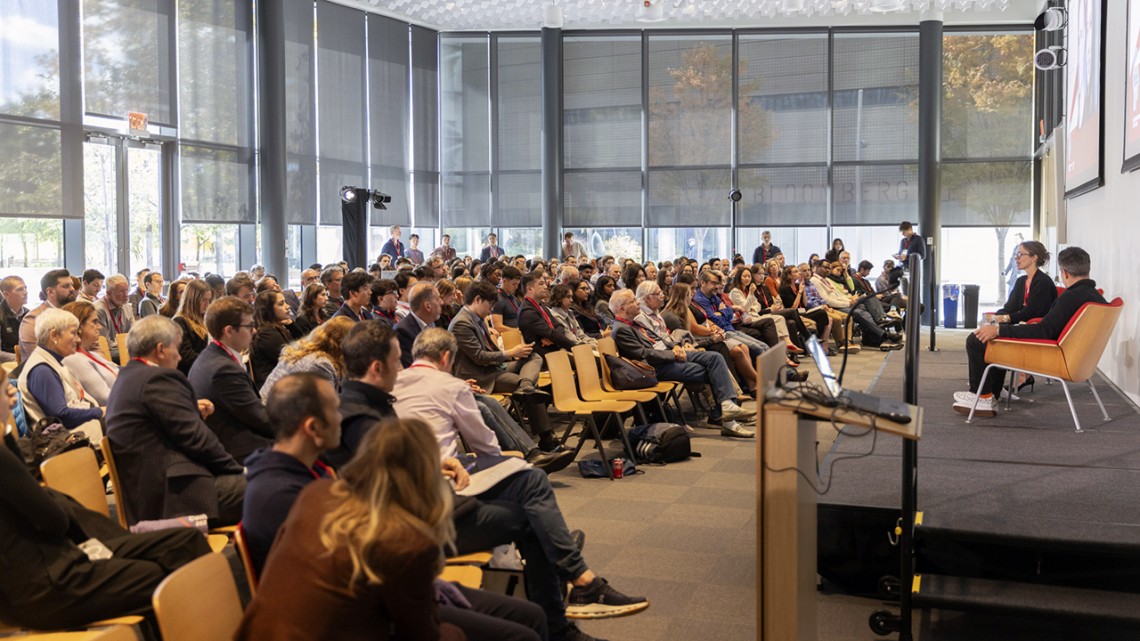
“I like to dream, but I don’t like to plan.”
“Founding my college T-shirt company was where I got the itch to continue in business.”
“I keep a document with the mistakes I’ve made with past hires, so I don’t make them again.”
Speakers who are Cornell University alumni shared these insights and many more on Oct. 31 at Eclectic Convergence 2025, a conference hosted by Entrepreneurship at Cornell at the Cornell Tech campus in New York City.
The event also included a pitch contest among businesses with connections to Weill Cornell Medicine or Cornell Tech. All five competing startups were trying to address an unmet need in biomedicine spanning curative cell therapy for chronic diseases, noninvasive chronic disease monitoring, an innovative medical device for cardiac care, a database with machine learning models to track hormonal cycles for effective endometriosis diagnosis and treatment, and a liquid biopsy platform to better analyze and sequence cell-free RNA.

CEO and Co-founder of Conform Medical Vidur Sahney presenting.
Vidur Sahney, CEO and co-founder of Conform Medical, pitched their catheter device. The foundational technology of Conform Medical was developed by Dr. Simon Dunham and Dr. Bobak Mosadegh, both faculty members of Weill Cornell Medicine’s Radiology Department and co-founders of the company. Their catheter integrates advanced soft robotics with electronics to create a flexible, stretchable single device that adapts to the heart’s complex anatomy and enables more accurate cardiac mapping and ablation.
Persista Bio, a biotech startup that’s developing a Type 1 diabetes treatment, won the pitch contest and the $5,000 top prize. Persista Bio is working on a long-term cell implant that automatically regulates blood sugar. In preclinical testing, the company’s prototype device normalized blood glucose in diabetic animal models for 90 days, said Dr. Linda Templeman, CEO and co-founder.
The company’s other co-founder is Dr. Minglin Ma, professor of biological and environmental engineering in the College of Agriculture and Life Sciences, whose lab developed a technology vital for the implant. The company is part of Cornell’s Center for Life Science Ventures.
“Every year the conference includes different speakers from all over the map,” said Zach Shulman, director of Entrepreneurship at Cornell. “We also had, for the first time, two sets of spouses interviewing each other. It was a great day.”
Conference speakers included Chris Kirby, founder of Ithaca Hummus, who spoke of his strengths as a founder and the importance of hiring others who complement your skill set. Kirby also emphasized taking action, rather than endless planning.
“My first priority,” Kirby said, “has always been to build a product that is so good, consumers just can’t get enough of it.”
Marissa Alden, general manager of recreation at DaySmart, founded a T-shirt company for her sorority as a Cornell undergrad. She also worked for Campus Promotions, a Student Agencies company, going door to door selling ads for a dining guide.
She went on to found two tech companies, with help from venture capital funders. “I love the dream phase mentality,” she said.
Javed Singha, was the co-founder and president of Fieldwire, a jobsite management platform for construction teams. Now that his company has sold, he’s advising multiple startups, including SewerAI, a platform to manage underground infrastructure.
“I love it when my team comes up with something more impressive than I would have done,” Singha said.
The night before the conference, students in Cornell’s eLab business accelerator pitched their businesses to a crowd of alumni, entrepreneurs and potential investors and mentors. The event included a panel discussion hosted by Big Red Ventures.
“As a Cornell founder, especially going through the eLab process, it’s been really great to see everyone’s hard work coming to fruition,” said Bren Bodin, the founder of fashion startup FYBRE. “It was also interesting to see how the ecosystem of the city really comes out and supports founders.”
A version of this story, authored by Kathy Hovis, writer and podcast host for Entrepreneurship at Cornell, first appeared on the college’s newsroom.
Many Weill Cornell Medicine physicians and scientists maintain relationships and collaborate with external organizations to foster scientific innovation and provide expert guidance. The institution makes these disclosures public to ensure transparency. For this information, see profiles for Dr. Simon Dunham and Dr. Bobak Mosadegh.

